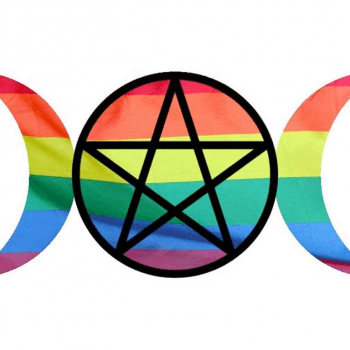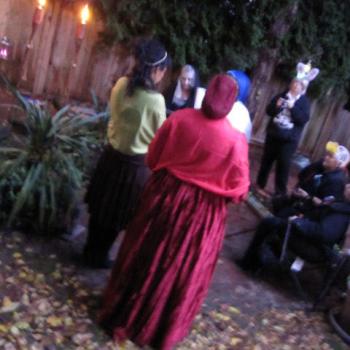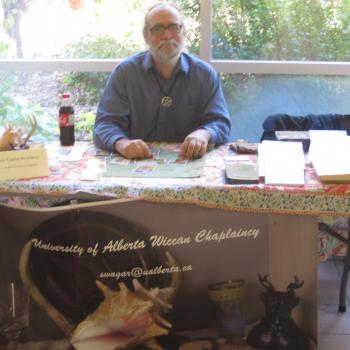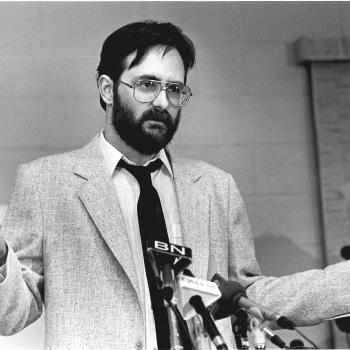
A key point in building public Wiccan temples and activities, one that has been underplayed to our detriment, is the idea of mission, the reason that we are doing this at all. Our mission on the largest scale and most generally, is to transform the religious culture wherever we are – to work toward a Wiccan and Pagan world. And on the local Temple level, active in our communities, to address one or two concrete areas where people are hurt and we can help – broad generalities are not as real as specific hurts and helps. One thing we must do right away is stop being unitarian and relativist – If we are truly unitarian, rather than ill-educated, inconsistent or lazy, truly believing and practicing “all paths are equally valid, all paths lead to the centre,” then why should we bother building our own thing, since it is no better than any of the alternatives? This notion is obviously not true, if one thinks about it, and some of our ideas are important independent contributions to the religious world of ideas and experience.
What we need to do is to tell a new story of encounters with the divine and to shape our mission and efforts around this new story rather than trying to fit our new things into previously determined structures or a community that has already been set up. We need to organize ourselves to accomplish the tasks ahead of us, the functions that our groups fulfill, rather than be based on ideological preconditions. What we need to do in finding and telling this story is to listen to the Gods, to the needs and experiences of the people around us, to look at how similar things have been done by others, and to trust our processes. Our new story must involve a here and now sensibility as well as the historical and mythological sources. But we must begin with the needs of the spirit, and of the people that we serve in our religious communities, and not principally with the needs of the founders and leaders of our organizations.

Leadership is essential but democratic governance is the best way to ensure its effective use – the movement has progressed past the stage of being purely a religion of the clergy and we cannot grow and develop into the movement we want to see or the people that we want to be without rethinking this notion. In many ways, those best suited to be prophetic leaders and the inspirational originators of groups are very poorly suited to administer or to long-term leadership of those groups – we need to value and nurture different leadership skills, including management skills. In the same way, there cannot be only one type of spiritual leadership valued in our religion- different needs exist and different means to satisfy them as well.
99+% of the population are not Wiccan or Pagan and we have a tremendous opportunity for growth if we can find the mechanisms to find, attract, train and engage people and the courage to commit ourselves wholeheartedly to our path. The great majority still will not be interested in Wicca and so we need to be thoughtful and strategic in our approach, to be good stewards of our limited human and material resources. Rather than trying to attract people in a passive “build it and they will come” fashion or in the scattershot evangelical approach (knocking on door as “Rhiannon’s Witnesses”?!) we need to reach out to potentially Pagan communities and groups and build relationships with them in an active and engaged way. We must keep in mind differences but focus on the common message. Why is Wicca a good set of ideas and what is the underlying foundation set that we expect people in our temples to adopt and work through? Everything else is a matter of taste and we will cheerfully work with a variety of flavours.

Religion is not a popularity contest, but every little stylistic detail is not a theological essential. Our lack of a tradition of built Temples will serve us well in adopting a more fluid approach to ritual and to religious discussion and development. We will have a greater portion of human and material resources to devote to service, with fewer buildings to tend or pay for, and a greater flexibility in the spaces that we use and the purposes that we can put them to.
The base line theological agreements of our movement – that we are polytheists who see the divine as both female and male; that women and men, gay or straight, are all capable of embodying the divine and acting as clergy; that pleasure and the joys of life are routes to the divine and deeply meaningful, not delusions or blind alleys leading us away from understanding; that magic works and on the underlying truths of the mystical path – these ideas are worth engaging with and building an organization around. Our organizational principles of congregationalism and internal democracy, Priesthood that are responsible to the organization as a whole and to the service of particular congregations, these are also good, balancing flexibility, adaptability, and the capacity to work together toward our common goals.

My church includes a range of approaches to our common religion, although not all Pagans or even all Wiccans will be comfortable with our range, which is perfectly okay with us. No single religious body can serve all of the spiritual needs of all people nor embrace all paths as equally valid within it- by accepting that we are called to a smaller range of service based on a more limited understanding we embrace our specific commitments fully, and we may hope to develop a deep and rich involvement with these ideas. And by jointly agreeing to this range of belief and practice we welcome all who also agree with us to join in our fellowship. Our decisions and beliefs, however, are not arbitrary or whimsical and if a person or group cannot commit themselves to working with us through our established agreements, but requires us to accept theirs instead, then this disrespectful arrogance will quickly lead to a parting of ways. Difference is not antagonism and I wish those who cannot work with this approach good luck, somewhere else.












